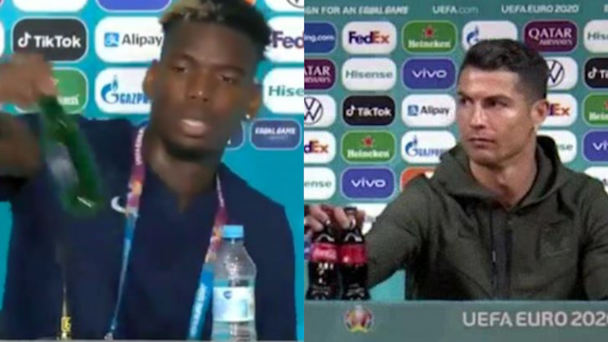Do Ronaldo and Pogba’s drink removals show the risky future of sports sponsorship?
Steve Kuncewicz, head of creative, digital and marketing sector group and partner at law firm BLM, questions how Coca-Cola and Heineken could pay the penalty after failing to score with Ronaldo and Pogba.

Footballers Paul Pogba and Cristiano Ronaldo made a stand at Euro 2020 press conferences
After replacing a Coca-Cola bottle with water at a post-match Uefa Euro 2020 press conference, Cristiano Ronaldo has supposedly single-handedly wiped $4bn off the company’s share price. The next day, France star Paul Pogba made a similar move, removing bottles of Heineken from his table mid-conference. Given the millions that will have been invested by the likes of Coca-Cola and Heineken into their respective Euro sponsorships, you can imagine the brands – and Coca-Cola’s shareholders alike – may be far from pleased with these particular endorsements, or lack thereof.
In the lucrative world of major tournament sponsorship, sponsors may hope that the organizations involved would take every available step to protect and promote the brand. However, when the event in question involves teams of high-profile, highly influential individuals, who sponsors have no say over, how can a brand ensure its product is not made a laughing stock on the world stage?
Sponsors shown the red card
Coca-Cola and Heineken likely only have a contractual relationship with Uefa, as opposed to any national team or player. We don’t know what the terms of the sponsorship are, but even if they stipulate that Uefa won’t do anything to bring the brand into disrepute, for example, the only real control that Uefa may be able to exert over national teams or even individual players will be set out in their disciplinary regulations. So, no matter how watertight a contract might be, it doesn’t necessarily extend to every team and every player involved in the tournament.
What’s more, the disciplinary regulations were last updated in 2020, and refer to breaches of the principles of ethical conduct, loyalty, integrity and sportsmanship, if anyone “brings the sport of football, and Uefa in particular, into disrepute”. As such, they’re framed with a set of higher ideals in mind and don’t really cater for protecting the interests of sponsors. As a result, it looks as if Coca-Cola and Heineken’s main remedy, if they have one, may be against Uefa directly, once the comms team has stabilized the situation as best they can.
Should Uefa decide to enforce the disciplinary regulations in these cases, if it can be convinced to take action, it may be through a fine or some other sanction. The likelihood is low though. I’m sure that both Ronaldo and Pogba will see themselves as most answerable to their fans. The Portugal star is a pop culture phenomenon and a health fanatic, so it’s at least understandable that he’ll feel uncomfortable promoting Coca-Cola to his audience. The same can be said for Pogba, who is also a devout Muslim who may not want to be associated with an alcohol brand (though it is worth noting that the drinks he removed were non-alcoholic).
All that said, Euro 2020 has confirmed that “everyone is entitled to their drink preferences”. Taking Pogba or Ronaldo on in the court of public opinion may be too risky a choice either for Uefa or for the sponsors in question. With their public platforms and sway (and well over 300 million Instagram followers combined), any further debate around this issue would play out in public, and the brands are already doing their best to try and move past the issue.
Are major sponsorships simply too risky these days?
Can you ever really control your brand messaging at this level? Coca-Cola has been in business with Uefa for over 30 years, and Heineken has been a partner in some form since the early nineties. Yet it’s only really been the case over the last decade or so that elite athletes have started to take a firmer ethical stance on who they do business with or endorse and why. In an era where the players have arguably as much, if not more, brand equity than the clubs or national teams they play for, it’s always possible that one of them may say something that a sponsor may not be comfortable with.
With brand safety at the heart of any major marketing strategies, working with bigger personalities with strong views looking to sway their audience, rightly or wrongly, may become a riskier proposition over time. If they were working directly with a social media influencer, then there’s certainly a greater opportunity to hold them accountable and exert more control over what they say.
Many have lamented (indeed, some have celebrated) that these incidents show that traditional product placement could be done for. I don’t think this is necessarily true, though. Many product placement opportunities come about through working with pretty predictable businesses where brands can have a good idea of perceived risk and the potential tone of the conversation in which they feature.
This kind of risk ultimately comes with the territory – unless a brand is willing to enter into agreements directly with key players as well, which may undercut the value of a wider sponsorship. If you’re working in a situation where high-profile individuals – in this case, players – are keen to protect their own image, as opposed to yours, then the idea of complete control is pretty much a myth. You’ll just need be agile and ready to react if and when a PR crisis such as this arises.
The best brands can do is to map out their risk before entering into a sponsorship agreement to make sure there’s the right alignment of values, and to identify whose voices they’re likely to have to plan for – and potentially do damage control for. In this case, Ronaldo and Pogba’s gestures spoke far louder than Uefa, Coca-Cola and Heineken’s words.
